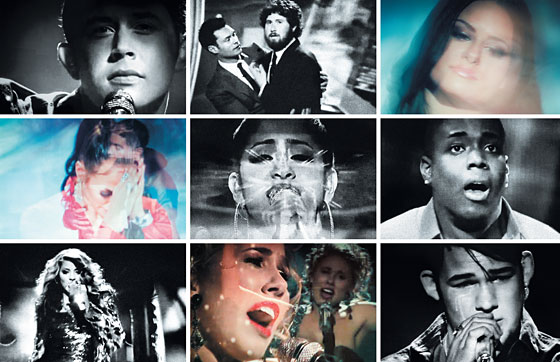
Nobody held a gun to my head and forced me to write recaps about the tenth season of American Idol. Although I feel like someone must have and I just forgot about it.
New York’s Vulture.com offered me the job in January. Way back when, I’d watched the first two seasons in their entirety. And in my capacity as a talking (and eventually hosting) head for VH1’s Best Week Ever, I saw a plethora of clips from the subsequent seasons. So I agreed to do the recaps, thinking, How much work could it be? It’s a dumb show that never changes.
What I didn’t take into account was the commitment involved. The show took over my life. And I’m not talking about the curious and uncomfortable emotional investment (more on that later). For eighteen weeks, and continuing through next week, I have not been able to make plans on a Wednesday or Thursday night, or Thursday or Friday morning for that matter. Because humans, it turns out, persist in needing sleep to function efficiently. On average, it takes me five hours to write each recap. I routinely finish around 3 a.m., send it, and immediately go to bed. If I do, indeed, then dream of American Idol, I am spared the memory by a compassionate God.
It didn’t have to be that way, I suppose. If I’d wanted to do a traditional recap—report the highlights of the episode, toss in a few jokes, a little analysis, make a prediction or two—it would have taken me far less time. But I was asked to write in my capacity as a professional humorist, so I figured I should do a satirical column disguised as a TV-show recap. That was my big idea. I cannot blame phantom guns for that one.
I begin each recap by fleshing out what happened on the episode. This is not easy to do, considering not much typically happens, particularly in the early episodes, the auditions. Nine years ago, when Idol first began, in my callow pre–middle age, I was able to slough off any pangs of guilt provoked by the exploitation of the mentally ill and delusional, which is essentially how Idol kicks off its months-long karaoke party. But when I became a man, I put away childish things; looking at the auditions this time, they just seemed so … gross. How many times can you laugh at someone being tone-deaf? And how amusing can the clearly troubled or stupid be? My challenge thus became how to be funny about something that’s supposed to be funny but isn’t funny.
There was a moment of relief after the auditions, once Idol was done with the weirdos. But the show then just flat-out goes on for a while. And we are encouraged to invest in people. What I find troublesome as an investor is that the vast majority of the hundred-plus contestants left plain ol’ don’t sing so good. You don’t have to be in the music business to know that. And this show is not searching for the next Leonard Cohen, right? So, obviously, a lot of contestants have been given a pass for time-filling purposes. We learn their personal stories—who got sick and is now better, who lost a friend or family member, who is the ghost of an old sea captain, etc.
And then the contestants start getting kicked off in droves. You might think the writing then gets easier, that fewer people means less to write. But no. Fewer people means even less happens in the same amount of time. Even less! This is simple math; why didn’t I see? In fact, it’s here, when you’re really supposed to start investing, when you’re down to the cream of the crop, that the challenge truly begins—how to invent different ways to say the same thing over and over: “This contestant is not a good singer and should not have advanced to this level, and in fact the whole competition should be shorter, concentrating on fewer singers who can sing better.” The same went for the judges (the new ones, Steven Tyler and Jennifer Lopez, and the veteran Randy Jackson), whose various tics and reactions calcified. I had a running joke at the end of all of my recaps on the predictability of Tyler’s critiques: “Steven likes it!” I had another running thing about Lopez, and my ever-deepening (and half-sincere) crush.
So little happens on the show that I had enough time for running jokes to begin, continue, and burn out, rising and falling with the speed of anthill dynasties, with weeks and weeks still to go. My early contempt for Tyler’s antics was later transferred to coach Will.i.am’s botched attempts at humor. I came to regard Tyler as you would a friend of a friend, one whose presence is frequent enough that the unpleasantness grows less impactful. You almost end up liking the person. But ultimately, you still don’t.

Early on, I took swipes at Tyler’s appearance; I made jokes about a chubby 16-year-old’s chubbiness. A friend reviewed one of these early recaps thusly: “Hilariously mean!” That struck me. I realized I was headed down a bad road. I long ago vowed, as Batman did before me, never to make fun of stuff that people couldn’t help. Because it’s (1) easy and (2) not fair. There are plenty of things that people have complete control over that are worthy of ridicule. So I concentrated on what people wore, how they mangled common phrases and idioms, and how they treated each other. This became a sped-up version of my journey on Best Week Ever. When the task is mocking pop culture, it’s easy to make sarcastic comments and consider the job done. After a while, I began to feel like this route was completely pointless. Talking about silly, inconsequential stuff doesn’t mean you can’t put some effort into it. So I tried harder. I took care to at least make some kind of point.
That all came back to me when I saw the word mean. I wanted to be able to stand by my Idol commentary.
So from then on, I considered what I was writing more carefully, soon realizing that the hardest thing to do is make fun of contestants without being nasty. I eventually figured out the way in: Most of the contestants believed that they were excellent singers. Therefore, if they weren’t, I could totally make fun of them! Fantastic! I felt within my rights taking shots at people who crave the validation of strangers, since I’m a stranger-validation craver myself! (Take my very low opinion of recently ousted James Durbin’s parenting skills: His sob story included having no money for food and diapers—was entering a singing contest really the most responsible solution?)
That approach worked with everyone except the youngest contestants. Too young! Why did I get dealt the season where they let essentially children enter, to be judged by an entire nation? What is this, Charles Dickens tymes? I am a gentleman of the old school, and I consider it unsporting to ridicule children unless it’s in private and with good friends. How do I criticize them without being a bully? By turning on a more appropriate target (which, in my personal comedy code, is always the most powerful): the glorified sweatshop owners exploiting the dreams of these kids, the producers of this bloated cash cow. So as the weeks wore on, my jokes became less about the performances and more about the situation in which the contestants were placed. Even my jokes about inevitable winner Scotty McCreery centered less on him than on the refusal of the judges to challenge him to be a better singer. (Actually, don’t quote me on that. I made fun of him a lot.)
Ultimately, Idol’s pervasive cynicism got me down. I think it’s because I can feel myself being tricked. One weird evolution, which might be related to Stockholm syndrome, was my reaction to Haley Reinhart. I started out not liking her simply because she looked like an acquaintance I don’t care for. But as the season wore on, I began to identify with my captors. Haley became my favorite. But even then, it wasn’t about her singing. With all the contestants I came to enjoy, it had more to do with their personality than their singing. None of them is an artist I’d listen to in my own life; they are simply people I like. On Thursday, when the winner is announced, I’ll be sad for the loser. I bet I’ll even be happy for the winner. Because I have a beating heart.
On Best Week Ever, I met a few previous Idol winners, and they were the nicest young people you’d ever want to meet. It is a tribute to them that they emerged from Idol’s cynicism factory seemingly without mercury poisoning of the soul. I wish them all well. But mostly, I’ll be happy to have those two days back.
Read Paul F. Tompkins’s Idol recaps at Vulture.com.